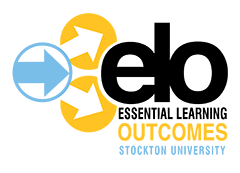Essential Learning Outcomes for Physics
 Stockton University’s 10 Essential Learning Outcomes (ELOs) combine Stockton’s flexible and Stockton's ELO logo distinctive liberal arts education
with real-world, practical skills. They guide all Stockton University students from
first-year through graduation to the intellectual and marketable talents needed to
prepare for personal and professional success in the 21st century. As a set of values
shared by everyone in the campus community, students encounter opportunities to develop
ELOs in all Stockton majors, career preparation, professional experiences both on
and off-campus, and academic as well as social activities.
Stockton University’s 10 Essential Learning Outcomes (ELOs) combine Stockton’s flexible and Stockton's ELO logo distinctive liberal arts education
with real-world, practical skills. They guide all Stockton University students from
first-year through graduation to the intellectual and marketable talents needed to
prepare for personal and professional success in the 21st century. As a set of values
shared by everyone in the campus community, students encounter opportunities to develop
ELOs in all Stockton majors, career preparation, professional experiences both on
and off-campus, and academic as well as social activities.
Learning Outcomes for Calculus-Based Physics Courses
Upon successful completion of the following courses: PHYS 2220 Physics I, PHYS 2230 Physics II, Physics III, Computational Mechanics, Electronics, Thermal Physics, E&M, Optics, Quantum Mechanics, etc. The student will have aquired the following knowledge and skills:
- Demonstrate the understanding of the fundamental concepts/laws in physics by explaining and discussing both verbally and in written language the physics concepts listed in course content, as well as their relevance to everyday events and circumstances in a broad interdisciplinary context.
- Demonstrate critical thinking/analytical reasoning ability by using algebra, trigonometry, and calculus to set up mathematical descriptions of physical systems and to calculate measurable quantities that provide an understanding of the physical environment in terms of the concepts listed in the course content.
- Demonstrate the ability to apply knowledge/skills to real world settings.
- Demonstrate the ability to analyze/solve complex problems by retaining information from course to course to solve integrated problems.
Learning Outcomes for Algebra-Based Physics Courses
Upon successful completion of the following courses: PHYS 2110 PLS I–Physics for Life Sciences I & PHYS 2120 PLSII–Physics for Life Sciences II, the student will have acquired the following knowledge and s
- Demonstrate the conceptual mastery of subject matter knowledge.
- Demonstrate ability to plan and carry out the problem solving process.
- Demonstrate competence in applying to everyday life/things/major field, to understand how objects around us work.
Learning Outcomes for Physics Laboratory Courses
Upon successful completion of the following laboratory courses: PHYS 2115 PLS I Lab – Physics for Life Sciences I Lab, PHYS 2125 PLS II Lab – Physics for Life Sciences II Lab, PHYS 2225 PHYS I Lab, PHYS 2235 Physics II Lab, the student will have acquired the following knowledge and skills:
- Demonstrate the understanding of the fundamental concepts/laws in physics by setting up laboratory equipment safely and efficiently and planning and carrying out experimental procedures.
- Demonstrate the ability to apply knowledge/skills to real world settings by identifying possible sources of error and implementing techniques that enhance precision.
- Demonstrate critical thinking/ analytical reasoning ability through analyzing and interpreting experimental data.
- Demonstrate effective oral/written communication skills/ability by reporting verbally and in written language the experimental data, results, and assessment of reliability.
- Demonstrate teamwork skills/ ability to collaborate by working in groups on a laboratory
experiment.
Demonstrate ability to innovate and be creative in a laboratory experiment.


